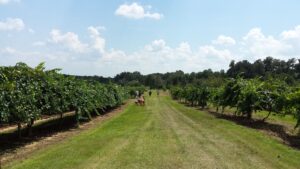
Photo courtesy famu.edu
FAMU’s College of Agriculture & Food Sciences has been granted two new grape patents. This is a huge accomplishment for the university and, more specifically, for the FAMU Center for Viticulture and Small Fruits Research.
The researchers at the center have named these two new strains of muscadine grape plants: the Floriana and Florida Onyx grape plants.
These are the two newest additions to the grape industry. Muscadine grapes originated in the southeastern region of the United States and are typically used in making artisan wines, juices and jelly.
Cypress Bend Vineyards wrote about the benefits of the muscadine grapes, stating that they are “fat free, high in fiber and they are high in antioxidants, especially ellagic acid and resveratrol. Ellagic acid has demonstrated anticarcinogenic properties in the colon, lungs and liver of mice. Resveratrol is reported to lower cholesterol levels and the risk of coronary heart disease.”
According to a press release issued by FAMU and the Viticulture Center, Floriana is described as “a self-fertile wine grape vine that is highly productive, resistant to Pierce’s disease (PD) and low cases of the fruit ripening rot and able to produce fine red wines.”
The most distinguished characteristics of Floriana is its high-quality wine, rich and stable red color, and consistent high yield.
Florida Onyx is described as a “pistillate (female) grape vine that is highly productive, resistant to Pierce’s disease (PD), low fruit ripening rot and relatively low wet scar.”
The most outstanding characteristics of Florida Onyx are its large, deep black-red colored berry with extremely pleasant fruit flavor.
According to famu.edu, the FAMU Center for Viticulture and Small Fruits Research was established by the Florida Legislature in 1978, making it the oldest specialized viticulture research program in the southeastern United States.
The center was established with Florida Senate Bill 898, identified as the Florida Viticulture Policy Act, to provide leadership, undertake research, extension and development activities that will contribute to industry growth and development.
Grapes are the second biggest fruit crop (by acreage) in the country and second in the world to bananas. Muscadine grapes and wines are produced in 12 states. The economic impact of the muscadine grape and wine industry have grown tremendously due to an increased market demand of wine and healthy foods, according to famu.edu.
Florida’s wine and grape industry has been one of the nation’s great agricultural success stories with huge economic benefits, making this a major step in research for FAMU.